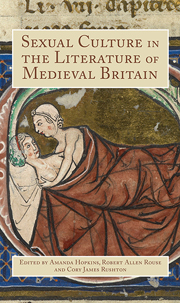Book contents
- Frontmatter
- Contents
- Introduction A Light Thrown upon Darkness: Writing about Medieval British Sexuality
- 1 ‘Open manslaughter and bold bawdry’: Male Sexuality as a Cause of Disruption in Malory's Morte Darthur
- 2 Erotic (Subject) Positions in Chaucer's Merchant's Tale
- 3 Enter the Bedroom: Managing Space for the Erotic in Middle English Romance
- 4 ‘Naked as a nedyll’: The Eroticism of Malory's Elaine
- 5 ‘How love and I togedre met’: Gower, Amans and the Lessons of Venus in the Confessio Amantis
- 6 ‘Bogeysliche as a boye’: Performing Sexuality in William of Palerne
- 7 Fairy Lovers: Sexuality, Order and Narrative in Medieval Romance
- 8 Text as Stone: Desire, Sex, and the Figurative Hermaphrodite in the Ordinal and Compound of Alchemy
- 9 Animality, Sexuality and the Abject in Three of Dunbar's Satirical Poems
- 10 The Awful Passion of Pandarus
- 11 Invisible Woman: Rape as a Chivalric Necessity in Medieval Romance
- Notes on Contributors
- Index
1 - ‘Open manslaughter and bold bawdry’: Male Sexuality as a Cause of Disruption in Malory's Morte Darthur
Published online by Cambridge University Press: 05 August 2014
- Frontmatter
- Contents
- Introduction A Light Thrown upon Darkness: Writing about Medieval British Sexuality
- 1 ‘Open manslaughter and bold bawdry’: Male Sexuality as a Cause of Disruption in Malory's Morte Darthur
- 2 Erotic (Subject) Positions in Chaucer's Merchant's Tale
- 3 Enter the Bedroom: Managing Space for the Erotic in Middle English Romance
- 4 ‘Naked as a nedyll’: The Eroticism of Malory's Elaine
- 5 ‘How love and I togedre met’: Gower, Amans and the Lessons of Venus in the Confessio Amantis
- 6 ‘Bogeysliche as a boye’: Performing Sexuality in William of Palerne
- 7 Fairy Lovers: Sexuality, Order and Narrative in Medieval Romance
- 8 Text as Stone: Desire, Sex, and the Figurative Hermaphrodite in the Ordinal and Compound of Alchemy
- 9 Animality, Sexuality and the Abject in Three of Dunbar's Satirical Poems
- 10 The Awful Passion of Pandarus
- 11 Invisible Woman: Rape as a Chivalric Necessity in Medieval Romance
- Notes on Contributors
- Index
Summary
As Roger Ascham famously observed, Malory's Morte Darthur is primarily concerned with ‘open manslaughter, and bold bawdry’. I would not disagree; in fact, I would say that these themes are not only dominant but are inextricably interwoven. Male sexuality, in Malory, is consistently portrayed as potentially violent and disruptive, dangerous not only to individuals but to the whole structure of society, and therefore in need of controlling measures. The medieval world did not, of course, often portray any form of sexuality positively. Sexual desire leads both men and women to sin: both directly in committing fornication, incest and adultery, and indirectly in committing treason or disregarding their duties. It could easily be assumed that this is a divide between the clergy on the one side, themselves compelled to live in celibacy and thus suspicious of sexual desire, and the more relaxed nobility and commons on the other, cheerfully ignoring the rules when it suited them. However, this is too simple a dichotomy. Malory himself, despite the bold bawdry, shares in the suspicion of unregulated desire, in his nostalgia for a chaster time,
nowadayes men can nat love sevennyght but they muste have all their desyres … But the olde love was nat so. for men and women coulde love togydirs seven yerys, and no lycoures lustis was betwyxte them, and than was love trouthe and faythefulnes.
- Type
- Chapter
- Information
- Sexual Culture in the Literature of Medieval Britain , pp. 13 - 26Publisher: Boydell & BrewerPrint publication year: 2014



